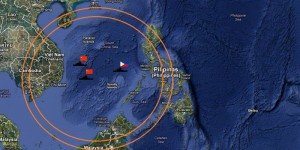
A Vietnamese official and two Filipino lawmakers here had objected to a draft of the Baku Declaration, which made no mention of the United Nations Convention on the Law of the Sea (Unclos) as a legal avenue for resolving the territorial disputes between China and members of the Association of Southeast Asian Nations (Asean).
The draft declaration reads: “We support peace and diplomacy and practical approaches such as joint exploration and development to resolve territorial disputes in parts of Asia, based on international law and the UN Charter, without resorting to the threat or the use of force. Political differences on such territorial disputes must not become impediments to normal economic and cultural interaction, based on mutual benefit.”
On Friday night, the Baku Declaration was finally approved but without the controversial proposal contained in the draft declaration.
Vietnam and the Philippines succeeded in deleting the proposal for a joint exploration and development of the West Philippine Sea with China. The amendment was unanimously approved by the assembly.
The approved Baku Declaration reads: We also support resolving territorial disputes in parts of Asia, based on the accepted principles of international law and the UN Charter, rather than resorting to the threat or the use of force. Political differences on such territorial disputes must not become impediments to normal economic and cultural interaction, based on mutual benefit.”
On Thursday, a Vietnamese political party official approached Cagayan de Oro Rep. Rufus Rodriguez and Western Samar Rep. Mel Senen Sarmiento to discuss the proposed text of the declaration of the assembly. The declaration was set to be adopted Friday night.
Icapp is an organization of 318 political parties in 52 Asian nations.
Some 230 Icapp members are meeting here for two days in the capital of Azerbaijan, an oil-rich former Soviet colony at the crossroads of Eastern Europe and Western Asia.
Without naming the Vietnamese official, Rodriguez said: “Vietnam came to see me—that’s also my idea—because we can’t agree to joint development in the 200-mile economic zone, so we are sovereign there,” said Rodriguez.
He objected to the proposed declaration. “We can’t agree to joint development (with China in) the 200-mile economic zone (of the Philippines and Vietnam, respectively),” he said.
Rodriguez said that Vietnam and the Philippines were “sovereign there,” referring to the 200-mile exclusive economic zone (EEZ) of every archipelagic country under Unclos.
The Unclos sets the EEZ to up to 370 kilometers (200 nautical miles) from the coast in which states have the right to explore and exploit natural resources but allow freedom of navigation and overflight to others nations.
“So I asked it to be erased,” said Rodriguez.
Sarmiento shared Rodriguez’s apprehension. “I agree. We would want to work with China and with any other country for that matter to bring about economic growth but not at the expense of saying we’re giving up this area,” he said.
Former House Speaker Jose de Venecia Jr., founder of Icapp, had favored the idea of a “joint exploration and development of oil and gas reserves” in the West Philippine Sea.
“This is the practical, pragmatic, realistic and equitable solution for the sharing of the fruits of production and designation of fishing corridors,” he said.